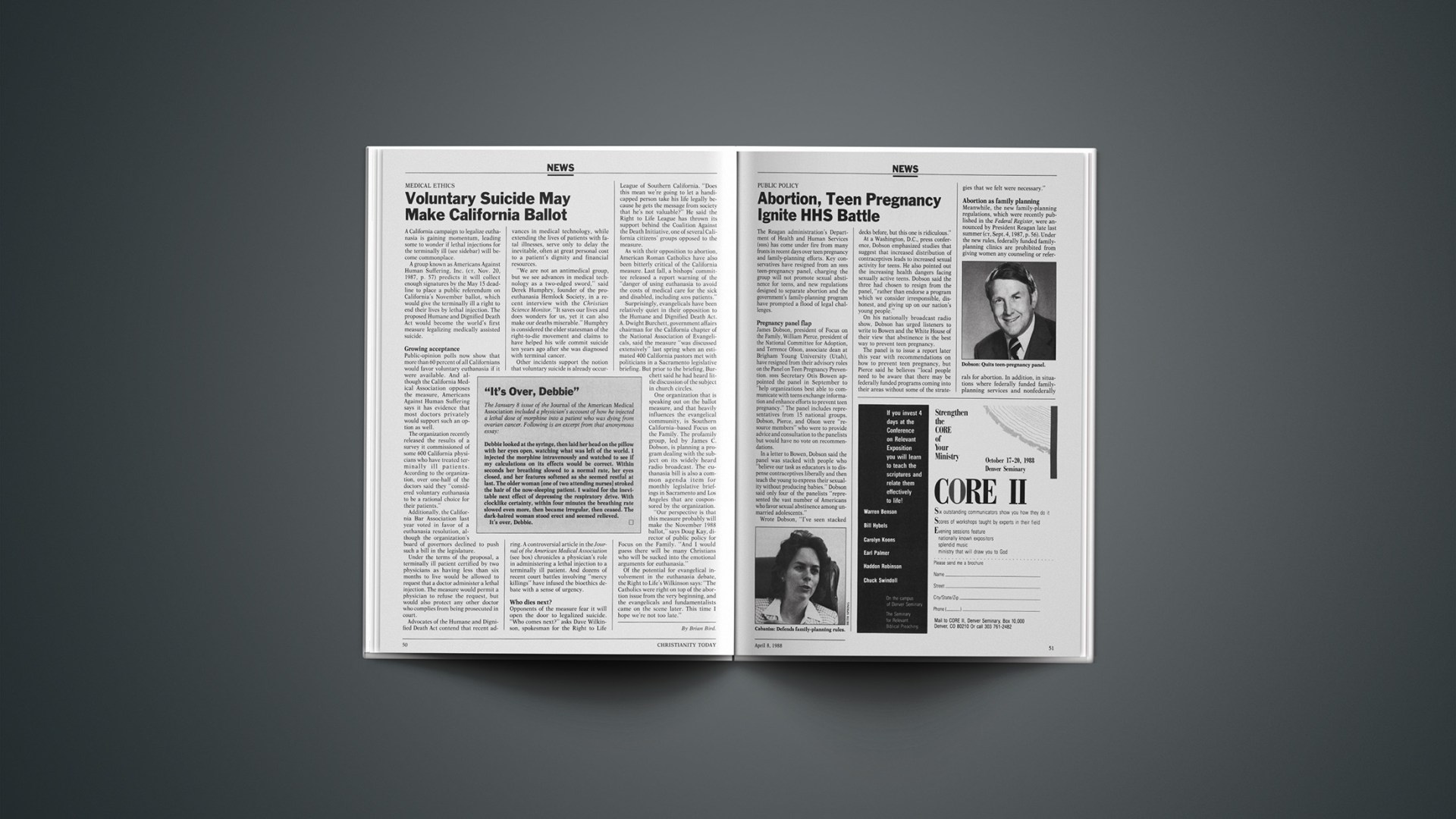A California campaign to legalize euthanasia is gaining momentum, leading some to wonder if lethal injections for the terminally ill (see sidebar) will become commonplace.
A group known as Americans Against Human Suffering, Inc. (CT, NOV. 20, 1987, p. 57) predicts it will collect enough signatures by the May 15 deadline to place a public referendum on California’s November ballot, which would give the terminally ill a right to end their lives by lethal injection. The proposed Humane and Dignified Death Act would become the world’s first measure legalizing medically assisted suicide.
Growing Acceptance
Public-opinion polls now show that more than 60 percent of all Californians would favor voluntary euthanasia if it were available. And although the California Medical Association opposes the measure, Americans Against Human Suffering says it has evidence that most doctors privately would support such an option as well.
The organization recently released the results of a survey it commissioned of some 600 California physicians who have treated terminally ill patients. According to the organization, over one-half of the doctors said they “considered voluntary euthanasia to be a rational choice for their patients.”
Additionally, the California Bar Association last year voted in favor of a euthanasia resolution, although the organization’s board of governors declined to push such a bill in the legislature.
Under the terms of the proposal, a terminally ill patient certified by two physicians as having less than six months to live would be allowed to request that a doctor administer a lethal injection. The measure would permit a physician to refuse the request, but would also protect any other doctor who complies from being prosecuted in court.
Advocates of the Humane and Dignified Death Act contend that recent advances in medical technology, while extending the lives of patients with fatal illnesses, serve only to delay the inevitable, often at great personal cost to a patient’s dignity and financial resources.
“We are not an antimedical group, but we see advances in medical technology as a two-edged sword,” said Derek Humphry, founder of the proeuthanasia Hemlock Society, in a recent interview with the Christian Science Monitor. “It saves our lives and does wonders for us, yet it can also make our deaths miserable.” Humphry is considered the elder statesman of the right-to-die movement and claims to have helped his wife commit suicide ten years ago after she was diagnosed with terminal cancer.
Other incidents support the notion that voluntary suicide is already occurring. A controversial article in the Journal of the American Medical Association (see box) chronicles a physician’s role in administering a lethal injection to a terminally ill patient. And dozens of recent court battles involving “mercy killings” have infused the bioethics debate with a sense of urgency.
Who Dies Next?
Opponents of the measure fear it will open the door to legalized suicide. “Who comes next?” asks Dave Wilkinson, spokesman for the Right to Life League of Southern California. “Does this mean we’re going to let a handicapped person take his life legally because he gets the message from society that he’s not valuable?” He said the Right to Life League has thrown its support behind the Coalition Against the Death Initiative, one of several California citizens’ groups opposed to the measure.
As with their opposition to abortion, American Roman Catholics have also been bitterly critical of the California measure. Last fall, a bishops’ committee released a report warning of the “danger of using euthanasia to avoid the costs of medical care for the sick and disabled, including AIDS patients.”
Surprisingly, evangelicals have been relatively quiet in their opposition to the Humane and Dignified Death Act. A. Dwight Burchett, government affairs chairman for the California chapter of the National Association of Evangelicals, said the measure “was discussed extensively” last spring when an estimated 400 California pastors met with politicians in a Sacramento legislative briefing. But prior to the briefing, Burchett said he had heard little discussion of the subject in church circles.
One organization that is speaking out on the ballot measure, and that heavily influences the evangelical community, is Southern California-based Focus on the Family. The profamily group, led by James C. Dobson, is planning a program dealing with the subject on its widely heard radio broadcast. The euthanasia bill is also a common agenda item for monthly legislative briefings in Sacramento and Los Angeles that are cosponsored by the organization.
“Our perspective is that this measure probably will make the November 1988 ballot,” says Doug Kay, director of public policy for Focus on the Family. “And I would guess there will be many Christians who will be sucked into the emotional arguments for euthanasia.”
Of the potential for evangelical involvement in the euthanasia debate, the Right to Life’s Wilkinson says: “The Catholics were right on top of the abortion issue from the very beginning, and the evangelicals and fundamentalists came on the scene later. This time I hope we’re not too late.”
By Brian Bird.
“It’s Over, Debbie”
The January 8 issue of the Journal of the AmericanMedical Association included a physician’s account of how he injected a lethal dose of morphine into a patient who was dying from ovarian cancer. Following is an excerpt from that anonymous essay:
Debbie looked at the syringe, then laid her head on the pillow with her eyes open, watching what was left of the world. I injected the morphine intravenously and watched to see if my calculations on its effects would be correct. Within seconds her breathing slowed to a normal rate, her eyes closed, and her features softened as she seemed restful at last. The older woman [one of two attending nurses] stroked the hair of the now-sleeping patient. I waited for the inevitable next effect of depressing the respiratory drive. With clocklike certainty, within four minutes the breathing rate slowed even more, then became irregular, then ceased. The dark-haired woman stood erect and seemed relieved.
It’s over, Debbie.










